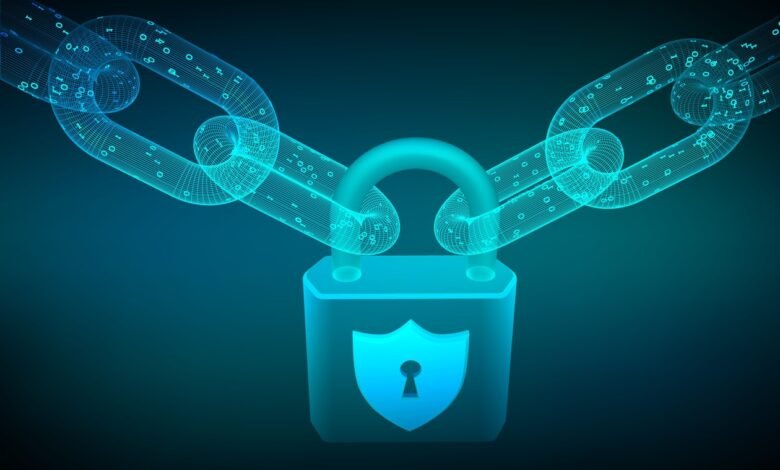How Blockchain Can Improve Cybersecurity

In today’s digital age, cybersecurity has become a paramount concern for individuals and organizations alike. The increasing frequency and sophistication of cyberattacks have left us in constant fear of data breaches, identity theft, and financial loss. To combat these threats, innovative solutions are needed, and one technology that has been gaining prominence in the cybersecurity landscape is blockchain. In this article, we will delve into how blockchain can revolutionize cybersecurity and provide a robust defense against malicious actors.
Blockchain Can Improve Cybersecurity
In an era where data is a precious commodity and cyber threats loom large, the need for innovative and foolproof cybersecurity measures has never been greater. Traditional security systems, while effective to some extent, have shown their limitations in the face of evolving cyber threats. This is where blockchain technology steps in, offering a new paradigm for safeguarding sensitive information.
Understanding Blockchain Technology
Blockchain Can Improve Cybersecurity: Blockchain is a distributed ledger technology that underpins cryptocurrencies like Bitcoin. At its core, it is a decentralized and tamper-proof digital ledger that records transactions across a network of computers. Each transaction is stored in a block, and once added to the chain, it becomes immutable, making it highly resistant to alteration or deletion.
Read More: The Potential of Blockchain Technology in Pakistan 2023
The Vulnerabilities of Traditional Security Systems
Blockchain Can Improve Cybersecurity: Traditional security systems rely on centralized servers and databases, making them vulnerable to single points of failure. Hackers target these centralized systems, exploiting vulnerabilities and gaining unauthorized access. This has led to numerous high-profile data breaches and financial losses.
Blockchain’s Role in Securing Data
Blockchain Can Improve Cybersecurity: Blockchain addresses the weaknesses of traditional systems by decentralizing data storage. In a blockchain network, data is distributed across multiple nodes, making it extremely difficult for hackers to compromise the entire system. This decentralization enhances security and ensures that no single entity has control over the network.
Decentralization and Security
Blockchain Can Improve Cybersecurity: The decentralized nature of blockchain means that there is no central authority or intermediary involved in transactions. This eliminates the risk of data manipulation or unauthorized access by insiders, reducing the chances of data breaches.
Immutable Data Records
Blockchain Can Improve Cybersecurity: Once data is recorded on a blockchain, it is cryptographically secured and cannot be altered retroactively. This immutability ensures the integrity of data, making it an ideal solution for recording critical information such as medical records and legal documents.
Smart Contracts for Enhanced Security
Blockchain Can Improve Cybersecurity: Blockchain also introduces smart contracts, self-executing contracts with predefined rules and conditions. These contracts automate processes and ensure that agreements are executed only when specific conditions are met, reducing the risk of fraud and disputes.
Identity Management and Authentication
Blockchain Can Improve Cybersecurity: Identity theft is a significant concern in the digital world. Blockchain-based identity management systems offer a secure and transparent way to verify identities, reducing the risk of impersonation and unauthorized access.
Supply Chain Security
Blockchain Can Improve Cybersecurity: Blockchain can be used to track and verify the authenticity of products in the supply chain. This ensures that counterfeit goods are easily detected and eliminated from the market, protecting consumers and brand reputation.
Challenges and Limitations
Blockchain Can Improve Cybersecurity: While blockchain offers robust security benefits, it is not without challenges. Scalability, energy consumption, and regulatory hurdles are some of the issues that need to be addressed for widespread adoption.
Regulatory Considerations
Blockchain Can Improve Cybersecurity: The regulatory landscape surrounding blockchain and cryptocurrencies is still evolving. It is essential to stay compliant with local laws and regulations when implementing blockchain solutions.
Real-world Applications
Blockchain Can Improve Cybersecurity: Blockchain’s impact on cybersecurity extends to various industries, including finance, healthcare, and government. Real-world applications range from secure online voting systems to protecting sensitive medical data.
The Future of Blockchain in Cybersecurity
Blockchain Can Improve Cybersecurity: In the ever-evolving landscape of cybersecurity, blockchain technology is emerging as a powerful ally against the relentless onslaught of cyber threats. As we move forward into a digitally interconnected world, understanding the potential and implications of blockchain in enhancing cybersecurity is essential.
Evolving Cyber Threats
The digital age has brought with it a wave of increasingly sophisticated cyber threats. From ransomware attacks that hold organizations hostage to identity thefts that compromise personal data, the stakes are higher than ever. As cybercriminals adapt and find new ways to exploit vulnerabilities, the need for robust security measures becomes paramount.
Blockchain’s Role in Enhancing Cybersecurity
Blockchain technology, initially designed to underpin cryptocurrencies like Bitcoin, has shown promise as a game-changer in the field of cybersecurity. Its core principles of decentralization, immutability, and transparency offer unique advantages that can significantly bolster security.
Decentralization and Security
Decentralization lies at the heart of blockchain’s security prowess. Unlike traditional systems that rely on centralized servers, blockchain operates on a distributed network of computers (nodes). This decentralized architecture makes it exceptionally challenging for malicious actors to compromise the entire system. In a decentralized network, no single point of failure exists, reducing the risk of data breaches.
Immutable Data Records
Another critical aspect is the immutability of data recorded on a blockchain. Once a transaction or piece of information is added to a block and validated by the network, it becomes virtually impossible to alter retroactively. This cryptographic security ensures the integrity of data, which is invaluable for sectors like healthcare, where the accuracy of medical records is of utmost importance.
Smart Contracts for Automation and Security
Smart contracts, a feature of blockchain technology, are self-executing contracts with predefined rules and conditions. They enable automation and ensure that agreements are executed only when specific criteria are met. This automation reduces the risk of fraud, disputes, and human error, thereby enhancing security.
Identity Management and Authentication
Identity theft remains a persistent concern in the digital realm. Blockchain-based identity management systems offer a secure and transparent way to verify identities. Through cryptographic verification, individuals can prove their identity without disclosing unnecessary personal information, significantly reducing the risk of impersonation and unauthorized access.
Supply Chain Security
Blockchain’s utility extends beyond data security. It can be harnessed to track and verify the authenticity of products in the supply chain. This application ensures that counterfeit goods are easily detected and eliminated from the market, safeguarding consumers and preserving brand reputation.
Challenges and the Path Ahead
While blockchain holds immense promise, it’s not without its challenges. Issues like scalability, energy consumption, and regulatory considerations need to be addressed for broader adoption. The blockchain community is actively working on innovative solutions to overcome these hurdles.
The Future Landscape
As cyber threats continue to evolve and adapt, the role of blockchain in cybersecurity will only grow more significant. Its adoption is expected to permeate various industries, including finance, healthcare, government, and beyond.
Read More: The Advantages of Blockchain Technology in 2023
Conclusion
In conclusion, the intersection of blockchain technology and cybersecurity represents a pivotal moment in the ongoing battle against cyber threats. As we navigate the complex and ever-evolving digital landscape, the importance of robust security measures cannot be overstated. Blockchain’s emergence as a cybersecurity stalwart offers a glimpse into a more secure and resilient future.
With its core principles of decentralization, immutability, and transparency, blockchain addresses many of the vulnerabilities inherent in traditional security systems. It introduces innovative tools like smart contracts and secure identity management, which not only enhance security but also streamline digital processes.
However, it is essential to acknowledge that the road ahead is not without challenges. Scalability concerns, energy consumption issues, and the need for regulatory frameworks pose hurdles that must be overcome for widespread blockchain adoption.
Blockchain Can Improve Cybersecurity: the promise of blockchain in cybersecurity is undeniable. Its ability to safeguard data, automate processes, and protect identities positions it as a formidable ally in the ongoing battle against cyber threats. As we move forward, blockchain’s influence is expected to extend across various industries, making our digital interactions more secure and trustworthy.
In a world where the digital realm plays an increasingly central role in our lives, blockchain stands as a beacon of hope, offering resilience and security in the face of evolving cyber dangers. Embracing blockchain technology represents a proactive step towards a safer and more secure digital future.
FAQs: Blockchain Can Improve Cybersecurity:
1. How does blockchain prevent data breaches?
Blockchain prevents data breaches by decentralizing data storage, making it difficult for hackers to compromise the entire system.
2. What are smart contracts, and how do they enhance security?
Smart contracts are self-executing contracts with predefined rules. They enhance security by automating processes and ensuring agreements are executed only when specific conditions are met.
3. Can blockchain be used for identity management?
Yes, blockchain-based identity management systems provide a secure and transparent way to verify identities, reducing the risk of impersonation.
4. What are the challenges of implementing blockchain in cybersecurity?
Challenges include scalability, energy consumption, and regulatory compliance.
5. In which industries is blockchain making the most significant impact in cybersecurity?
Blockchain is making significant impacts in industries such as finance, healthcare, and government, providing secure solutions for various applications.











